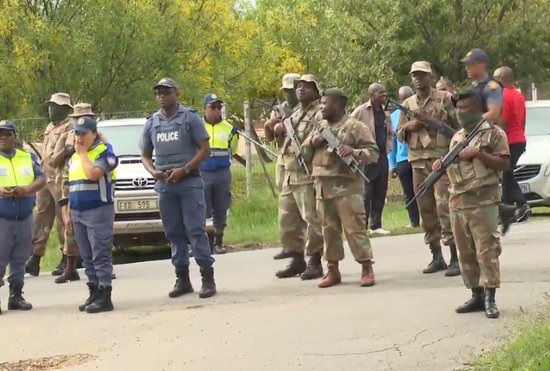SANDF denies deployment to monitor Eastern Cape GBV protest! The South African National Defence Force (SANDF) has refuted claims that it deployed soldiers to monitor or interfere with a recent community-led march against gender-based violence (GBV) in the Eastern Cape town of Matatiele.
The denial comes in response to public concern following sightings of SANDF members during a protest sparked by the alleged rape of a 7-year-old girl, an incident that has deeply shaken the small rural community.
Community Outrage After Child Rape Allegation
The Matatiele community has been in turmoil since news broke that a young girl was allegedly raped—an incident said to have occurred at or near a school. Outraged residents have been gathering in large numbers to protest the growing levels of gender-based violence in their region, demanding swift justice and stronger protections for women and children.
Footage and images circulated on social media showed SANDF personnel visibly present during one of the protest marches. Their appearance led some residents and activists to speculate that the military had been sent to monitor or possibly intimidate demonstrators—a claim that the SANDF has now strongly denied.
SANDF denies deployment
SANDF Clarifies Role in the Region
According to SANDF spokesperson Brigadier General Siphiwe Dlamini, the soldiers were not deployed in response to the protests, nor were they assigned to monitor civilian activities related to the GBV march.
Dlamini explained that the SANDF members in question were in the area as part of broader national safeguarding duties, which include border security and rural support operations. Their presence during the march, he said, was purely coincidental and had no connection to the protest itself.
“The SANDF is a gender-sensitive organisation and supports gender programmes. We are cognisant of the unacceptably high levels of gender-based violence and the prevalence of violence against women and children in South Africa,” Dlamini said in a statement.
He added that the organisation supports interventions by civil society and institutions aimed at combating gender-based violence and would never obstruct peaceful community-led actions intended to raise awareness around these critical issues.
Public Distrust and Misunderstandings
Despite the SANDF’s reassurances, the appearance of military personnel during a civilian protest has raised eyebrows among some members of the public, especially given the country’s sensitive history with state responses to protests.
Local activists argue that such misunderstandings could have been avoided with better communication from authorities. “Seeing armed soldiers near a peaceful march understandably made people feel uneasy,” said a community leader involved in organising the protest. “Even if it was unintentional, it sends the wrong message if we’re not told why they’re there.”
Others, however, welcomed the SANDF’s clarification and expressed appreciation for their continued support of gender-based violence awareness.
SANDF’s Ongoing Support for Anti-GBV Initiatives
The SANDF has reiterated its commitment to fighting GBV alongside government departments, NGOs, and local communities. Dlamini highlighted that the Defence Force regularly participates in gender awareness campaigns and internal training initiatives to promote a culture of respect and protection for all.
“As a national institution, we share in the responsibility to stand against gender-based violence. Our members are trained to uphold these values both on duty and in their communities,” Dlamini said.
The Way Forward
As investigations into the child rape case continue, the people of Matatiele remain resolute in their demand for justice. Community leaders say they plan to hold more marches and awareness events in the coming weeks, emphasizing that their cause will not be derailed by confusion or fear.
Meanwhile, the SANDF has called for continued dialogue and cooperation between government structures and the public to ensure clarity and avoid mistrust during emotionally charged situations.

